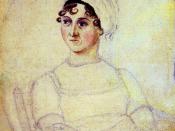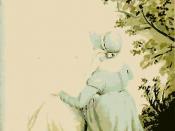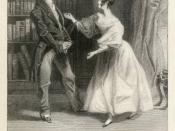Pride and Prejudice.
'On pride and prejudice, which in your opinion comes in for sharper criticism from Austen. Support your answer by referring to specific incidents and episodes.'
pride n., v., 1. high (or too high) opinion of one's own dignity, importance, worth, etc. 2. the condition or feeling of being proud. 3. a noble sense of what is due to oneself or one's position or character; self respect; self esteem.
prejudice n., v., 1. an opinion (usually unfavourable), formed beforehand or without knowledge, thought, or reason. 2. disadvantage resulting from some judgement or action of another. 3. the resulting injury or loss.
In my opinion, pride comes in for the sharper criticism by Austen. She has chosen to personify this trait in several characters in 'Pride and Prejudice' although it is hard to find one character who portrays prejudice alone, throughout the novel. When prejudice does occur in this novel, Jane Austen has shown it in the hands of a notoriously proud character.
Because prejudice is not personified (ie. depicted as a major characteristic flaw) I believe that it was not to be the object of Jane Austen's sharper criticism.
Jane Austen has depicted pride in her minor (functional) characters as a means of demonstrating it's importance as a theme of this novel. Lady Catherine is one of the main offenders, her airs, arrogance and pride are fuelled by other characters like Mr Collins who is put there to satire proud people and their followers. Another important character to note is Mr Darcy. He is an extremely important character in this novel, a major character, and I think that the fact that he was perceived to have been 'proud' at the beginning of the novel by the reader, Elizabeth, and the community of the shire, and our perception, along...



On Pride and Prejudice, which in your opinion, comes in for the sharper criticism by Jane Austen
the arguements in this essay are very valid, but the language used is not suitable to an essay. In an essay, it must be noted that there should be no use of the words "i,we, us". instead, use words like "the reader is made to feel..."
2 out of 2 people found this comment useful.